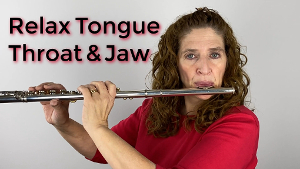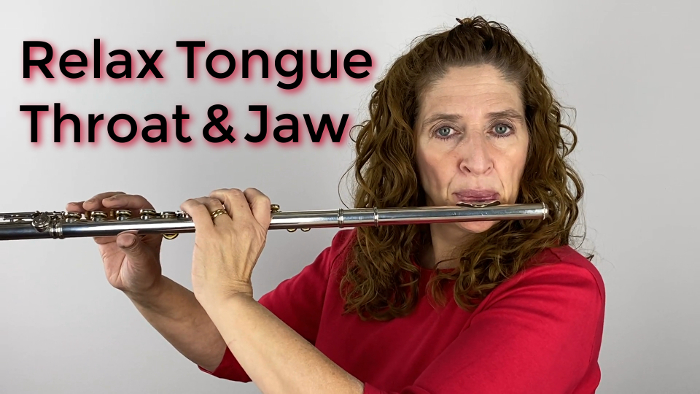Let’s talk about tension!
Tension is one of those areas that we all need to work on. Tension in the embouchure can prevent you from getting the sound you would really like to have. The problem is we don’t work on this. It is oft times ignored in our practice sessions.
I want to encourage you to figure out what is happening in your areas of tension especially as they pertain to the embouchure. Special places of tension are in the tongue, jaw and throat. These tension filled areas prevent you from having the sound you want to have. Tension locks the sound in the mouth instead of letting the sound come out through a relaxed embouchure.
When you begin to work on relaxing the throat, jaw and tongue then your sound begins to loosen up and can then begin to soar.
Tongue, throat, and jaw tension are something that can plague us throughout our flute-playing existence. If I am especially tired or a little bit out of shape, the first tension that I feel is in the jaw. After that, it shows up in the throat. It drives me crazy that when I need to have tension-free playing my jaw and throat tighten right up. This then gives me a tight tone. Then I get mad because my tone is tight, which in turn makes me tighter… it is a vicious circle.
Jaw tension leads directly to throat tension. Show me someone with a tight jaw and I’ll show you someone who has a tight throat. That is both good and bad. If I conscientiously begin to relax my throat, then it will be so much easier for me to relax my jaw and vice versa. I think about relaxing my throat first because it automatically relaxes the jaw.
Tongue tension is a bit easier to fix at least it is for me. I think tongue tension goes completely back to tonguing incorrectly. If you tongue improperly then there is a chance that you have a tense tongue. I was watching a video of a vocalist talking about tongue tension and how you can massage the tongue. It was all a little bit too much for me to think about massaging my tongue! But it was an interesting concept. The cure for this tense tongue is to lighten up. Lighten up your tongue (and your double tongue). Keep the tongue loose when tonguing, don’t tongue hard or hen pecky. This doesn’t mean you can’t accent notes, or tongue clearly. But the tongue doesn’t have to be harsh in order to tongue everything properly.
Double-tonguing is a big culprit when it comes to a tense tongue. A lot of people do this action incorrectly and thereby create a very harsh tongue. But if you keep the tonguing relaxed but still precise, you can move so much faster.
Something else to think about when it comes to jaw tension is the pressure of your left hand first finger. Many times, I find that students use way too much pressure pushing the flute into the jaw. I test how much tension there is by using one finger to gently move the head joint off the student’s lip. If I can fling it away with one finger, then it’s good. It almost never is. By pushing into the headjoint and into the lip, the tension begins in the fingers, and then the headjoint pushes into the jaw creating pressure and tension. When my jaw gets tighter, I know for a fact that the pressure of my first finger pressing the flute against my lip has gotten worse.
To really relax that jaw, it’s all about the throat. If you take a yawning breath, one that expands your throat and allows that upper part of your throat to open into your sinuses the tongue should go down.
Fast breaths in the middle of a fast section in music are rife with tight breaths. If I’m not prepared for a fast loose breath, then I will gasp for that breath instead of taking a quick relaxed breath that opens mu throat. Do you think that kind of breath is too slow? Au contraire! An open-throat breath can be just a quick as the gasp. It only needs to be thought about. We are programmed to take that gasping breath. It takes a lot of thought to take the right kind of a breath. But when I think through the breath and take a yawning breath, it feels good in my throat, and my jaw is completely, completely relaxed. If you have any TMJ problems, it is definitely something that you’d want to work on.
Now, it’s not easy to learn how to take that kind of a breath in the middle of a fast passage. You must work at it. You have to be consciously thinking about, “Oh, I took that gasping breath. Let me go back and fix it.” Because you will want to erase the mistake of the gasping breath and teach your brain that when you come to a spot where you need a fast breath, it must be the right kind of breath. Your throat needs to be open. When your throat is open for a breath, then when you come back in, your throat will stay open. This in turn will keep your tone beautiful all the way through.
Quite probably 100% of you have some type of tension in your playing. None of us are exempt from having throat tension, jaw tension, and even tongue tension. Ask yourself if you are having some tension in one or more of these areas. Is your tongue nice and loose, and staying down, and not tightly coming up to do your tonguing, which will slow you down when you want fast articulation? Are you pressing with your first finger against your lip? Or are you taking the gasping breath that then tightens the jaw? How about your throat is it loose as if you just yawned?
Enjoy working on relaxing your tension areas because it feels so much better to play this way and it results in a better tone. Now that’s worth working on!
Relax your tongue, relax your throat, and relax your jaw you will be glad you did!
Have fun!
DoctorFlute
Relaxing Your Tongue Throat & Jaw When You Play Flute – FluteTips 118

